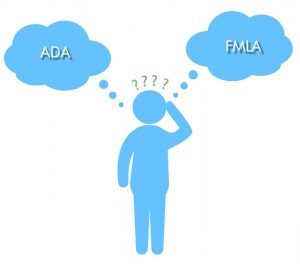
FMLA or ADA? This issue is a confusing one. When an employee becomes ill or requests leave to care for a family member, when is it considered Family Medical Leave (FMLA) and when is it considered an accommodation under the American’s with Disability Act (ADA)?
In most instances, when it is related to an individual’s serious health condition, both the FMLA and the ADA often work together. When it is to care for an employee’s child, spouse or patent, it is usually strictly an FMLA issue.
HR professional, will at times, be uncertain because the FMLA and the ADA are similar in some regards and at times an employer may find that the requirements of one law contradict the other. When these types of situations occur, it is important to remember that the law that provides the most protection to the employee, should be adhered to. Do more now, pay less attorney and litigation fees in the future!
The FMLA
The FMLA allows eligible employees to take up to 12 weeks of leave during any 12-month period to care for a newly born or adopted child; to care for a spouse, child, or parent (does not include parents-in-law) with a serious medical condition; or to attend to the employee’s own serious medical condition. It further extends to military leave, including 12 weeks’ leave for the employee and/or when their spouse, son, daughter, or parent of the employee is on or preparing to be called to active duty in the armed forces. It also provides a 26 week leave to care for a spouse, son, daughter, parent or next of kin who was harmed or injured and requiring care as a result of their active military activities, including veterans.
The ADA
The ADA does not apply to spouse, son, daughter or parents. The ADA applies only to a disabled employee. When an employee notifies you that the suffer from a disability and require an accommodation, the employer must engage in the interactive process to determine, what, if any, reasonable accommodation can be made to assist that employee. Reasonable accommodation under the ADA is required for the known physical or mental limitations of a qualified individual with a disability, unless doing so would impose an undue hardship on the operation of the employer’s business. It is important to note the “known physical or mental limitation” – the employee does NOT have to request an accommodation. If the disability is known and the employer can visibly determine that an employee is struggling or not performing their job at a certain level, liability can be found upon the employer for knowing of the employees limitations and not engaging in an interactive process with them. It is further also vital to note that an employee does not have to use the word “accommodation” – they can use plain language or make any informal notification that they are struggling to perform their job because of their disability and this, pursuant to the ADA, is enough notice to the employer to have them engage in an interactive process with the employee to see, what, if any, accommodations may be needed so that the employee can perform their position.
“Reasonable accommodation” includes making changes to the job functions of a disabled individual that permits a qualified applicant or employee with a disability to apply for a job, to perform the essential functions of a job, or to enjoy benefits and privileges of employment.
FMLA or ADA?
This is a very difficult decision, because employers are not doctors, they may not know when an illness qualifies as an illness or when it qualifies as an actual disability. For example, when an employee requests a medical leave due to complications of their diabetes, is this a temporary illness or a disability? Without years of experience dealing with these types of questions, the inexperienced HR personnel may consider this nothing more than an illness leave. They would not know that the underlying illness of diabetes is actually a covered disability under the ADA. The easiest and most effective way to combat the unknown is simply to implement both the ADA and the FMLA at the same time. In this way, the employer is complying with both laws, protecting the employee and themselves.
As an example, Joe suffers from MS which flares up from time and time and may require occasional absences. Joe qualifies for intermittent FMLA. However, you also know from talking with Joe that Joe’s flare-ups occur the most during the summer months due to the heat. There is that Aha!! Moment…the “should have known” clause of the ADA. A good HR person will know that it is not a bad idea to ensure that Joe is located in a cooler section of the office or provided with a portable A/C unit near his working station to accommodate Joe. By taking this simple and affordable step, you remove so many obstacles of potential liability.
The above is only minor examples of the numerous situations that are going to arise within any given work environment. While most HR professionals know the “basics” of the FMLA and the ADA – only someone with years and years of experience in HR legal compliance will know the pitfalls. That is why NotzHR is here – with 24 years working in the employment law field, NotzHR has the experience and know how to help reduce your liability when it comes to complying with FMLA and ADA issues.
